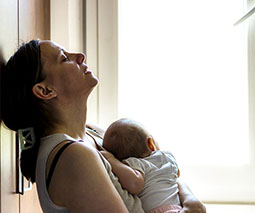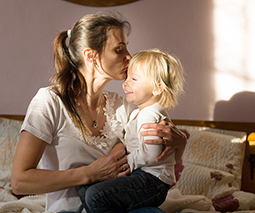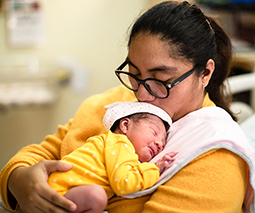A dad’s PND story: “I was doing everything I could, but it wasn’t enough.”

We talk a lot about how postnatal depression and anxiety affects mothers, but sometimes we forget that there are many fathers suffering in silence as well.
According to the Australian PANDA website, one in 10 dads experience postnatal depression and anxiety, often as a result of seeing their wife or partner go through PNDA as well.
We’ve heard a woman’s perspective this week during PNDA awareness week (12-18 Nov), and now it’s time to hear one father’s raw, blunt and honest account of what it’s like to live with postnatal anxiety and depression.
This is Justin’s* story

How long did your wife have PNDA for?
For much longer than we originally realised! In hindsight, both my wife and I can see that she suffered from perinatal depression. About eight weeks before our baby was due, my wife began putting up emotional walls between us and most of the people around us. At the time I didn’t really understand what was going on. I figured she was just nesting. This putting up of walls became even more chronic after our son was born.
When did you first start noticing something wasn’t right?
It was really hard to tell at the beginning. All new parents, but especially mums, are hurled into this crazy world of no sleep, no personal space, and non-stop challenge after challenge. So, when I arrived home after work each day to find my wife not coping (tired, crying, angry, resentful), it just seemed like an appropriate response in context.
I think I started to realise that something was really wrong when she would refuse to get out of bed in the morning and cried as I left the house for work (you might be surprised it took that long to click, but life with a newborn is no walk in the park!).
I would typically get up and feed our son in the morning, spend time with him if time permitted, then leave for work.
It got worse. She stopped responding to my call to come and help with our son as I was trying to get out the door. Even worse was her crying and pleading as I left for work.
I felt this huge pressure to get to work, but felt like I was leaving home when I was most needed. I think that was the first time it brought me to tears, and the first time I realised that it shouldn’t be this hard for anyone involved.

How were you able to support her? What was effective in relieving her stress and anxiety?
I was already doing the lion’s share of house cleaning, feeding our son, shopping and cooking, thinking that that would alleviate the situation. But it didn’t. It just wasn’t enough. My wife simply refused to accept help from outside the family and yet didn’t have the energy to do any of it herself.
In her words, all she could manage was to look after our son, and smile when she could.
I remember getting calls during work hours where she would be screaming down the line at me, “WHY AREN’T YOU HERE TO HELP? You’re never here to help! Why do I have to do it all by myself?” All the time our son was crying in the background.
I was SO stressed; I was doing all I could and we were still in freefall.
I spoke to my bosses candidly about what was going on and they graciously allowed me to take two days off a week to help support my family.
How were you affected by your wife’s PNDA?
It crushed me. I was 100 per cent ineffective at helping my wife (the one thing I should have been good at). I couldn’t motivate her. I couldn’t connect with her. I couldn’t see past this cloud that seemed to surround her, this cloud that descended on the house, and descended on me.
I remember waking up in the morning and feeling physically sick, nauseous at the prospect of making my work meeting on time (which was completely unlike me). I just couldn’t seem to make decisions. I’d get in the car and instantly worry about receiving phone calls from home, and the berating I’d receive for not being around to help. I was suffering anxiety, but didn’t know it. I just thought that it was a tough time of life and I’d get through it.

Did you seek help for yourself? Did anyone ask how you were coping or offer support to you?
I’m not sure who it was, but someone told me about PANDA, a phone line set up by the government to help people suffering from PNDA. I’d just received another anxious call from home as I left the city and began my hour and a half commute back home. I hung up and dialled PANDA straight away.
It was the best thing I could have done, a real turning point for me. A kind lady on the other end of the line asked me how I was, and all I could do was cry down the line at her. All the pain, hurt, frustration and anger I’d experienced just bubbled over. She just listened and reassured me. No one else had done that.
A few weeks later we checked ourselves into Tresillian. Our son was actually sleeping pretty well at that stage, but we weren’t coping and needed serious help from professionals. Upon entering they asked both of us to sit an Edinburgh anxiety and depression test. They typically flag and follow up men who score over 3 out of 30. I cracked a 19!
That was the bottom of it all. We sat on the bed while our son slept and cried together. I felt for the first time that my wife could see the tremendous effect this was having on me too. I felt validated by her simply recognising my pain. We picked ourselves up and have been on the up since.
In your experience, what is the biggest need for husbands whose wives are battling PNDA?
Come around and do it all. Drop around a meal. Hang out a load of washing. Take the baby out for a walk. Be generous. Then do it all again the next day. The most precious gift you can give a partner of someone suffering PNDA, is time. Time to sit and be with the person they love, who they no longer recognise, without feeling the pressure to cook clean and solve day-to-day problems. And most importantly, time to listen.
If I had listened, really listened, to my wife early on, we might not have had to fall so far. I would have stopped trying to ‘solve’ my wife, like she was the problem, and stopped trying to fix her problems for her. I would have actually looked into her. Felt her pain with her. Heard her cry for help though the insults and complaining that came my way. I would have helped her help herself.

Looking back, what is the biggest thing you have learnt from this experience?
I have a phenomenal relationship with my wife. I’m so proud of her. She’s so strong and loving and capable and delightful. Most of all she is an astoundingly present and patient mum to our son.
She got herself out of depression.
We were given literature that helped us understand how intrinsically mental health is tied to gut health. My wife grabbed onto this and together we embarked on a strict Paleo diet and invested time and energy into planning and cooking good meals together. This became our focus, and from my perspective, gave her something each day to focus on other than her negative thoughts. Slowly but surely, the cloud began to lift.
My wife saw a wonderful counsellor who helped her articulate and make some sense of her confusing mental state. This made a huge difference in helping her learn how to practically manage her negative thought processes and anxiety.
Similarly, I too saw a counsellor. He provided me with some helpful tools for dealing with the stress I was feeling. Most importantly he validated the pressure I was under. For some reason that gave me resolve and calm to manage at home and support my family.
What would you say to other fathers whose wives or partners are battling PNDA?
Postnatal depression is contextual to the chaotic season of life with young children. It will come to pass. During this time, be super soft, gentle, kind, loving and respectful to your wives. They may lash out, but don’t lash out back.
Listen with your eyes, your ears, your emotions and your fears. Your role is to be a rock upon which she can lean, rest, wail and pound her fists as she weathers her way through the storm. What a tremendous honour.
Once the storm has passed over, the experience will have drawn you closer to her than you thought possible. Closer than you were before. Be a man, love her selflessly, always.
*Not his real name.
If you or your partner is battling depression or anxiety following the birth of your child and you need to talk to someone, seek help. Called PANDA or Beyond Blue.
This story was published during PNDA awareness week (Nov 12-18). Babyology is taking the opportunity to increase awareness and help normalise this condition that affects and debilitates parents when they are at their most vulnerable with a baby.









